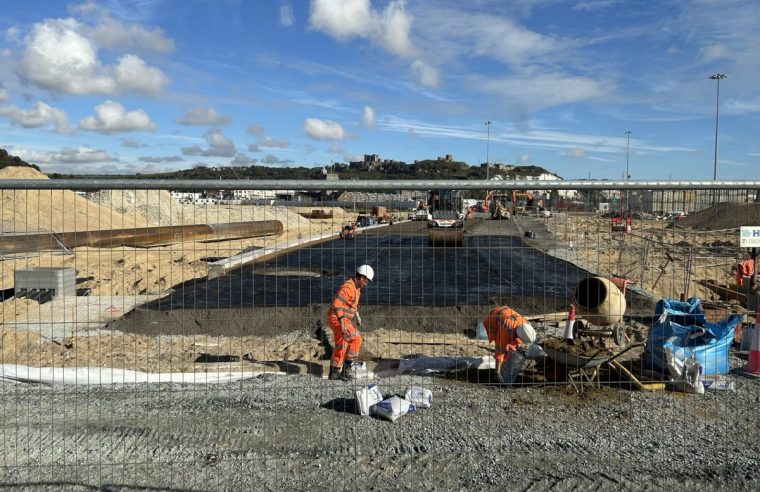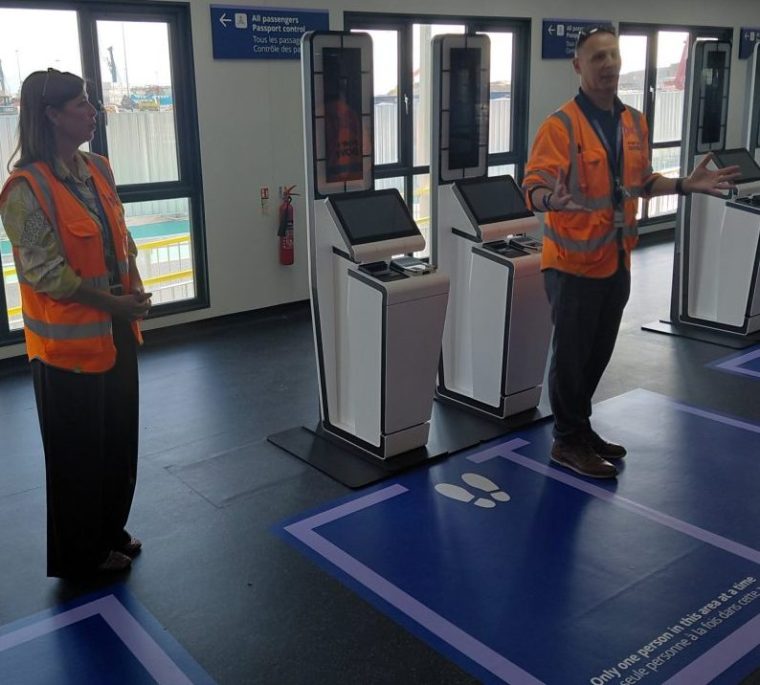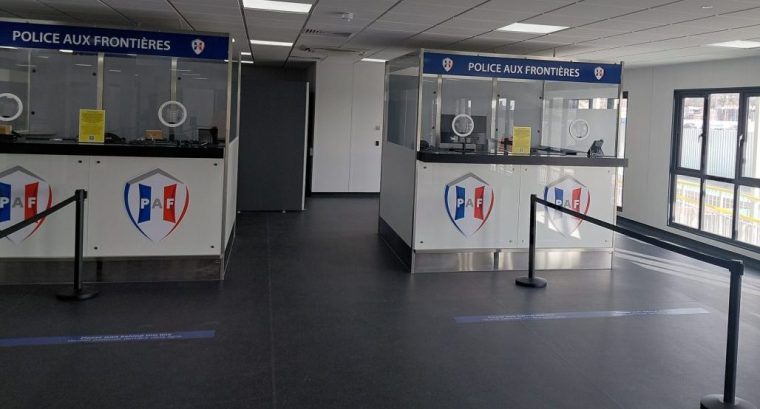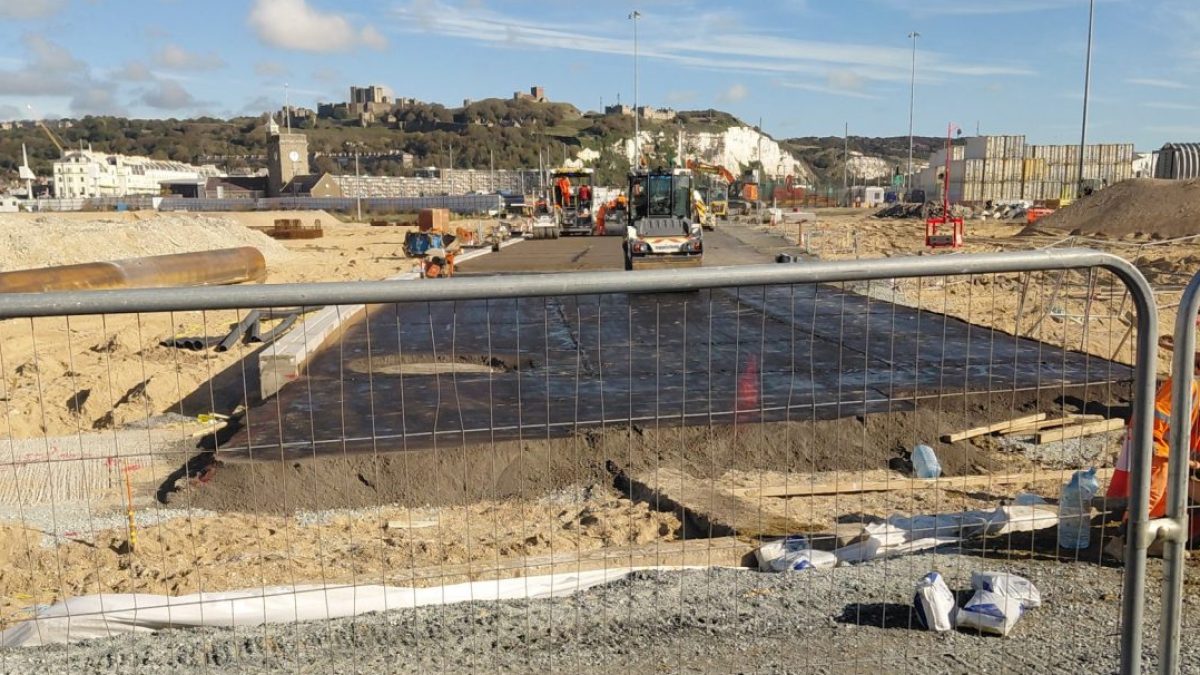Checks for cars at Dover will take up to six times longer – and kiosks to take passengers’ fingerprints may not be operational when EES launches on Sunday
Roads to enable post-Brexit fingerprint checks for travellers at Dover have not even been built yet, with less than a month to go before the rollout.
The new biometric checks will also take up to six times longer than the current system – and kiosks to scan fingerprints may not be operational when it launches for the first cohort of vehicles leaving the port on Sunday due to an IT glitch.
It is the latest farce to hit the delayed launch of Entry/Exit System (EES) biometric checks for non-EU citizens heading to Europe’s Schengen Area, the first phase of which begins at 5pm on 12 October.
New FeatureIn ShortQuick Stories. Same trusted journalism.
In Dover, they will apply to coach and freight travellers only, but passengers in cars will undergo the same checks from 1 November.
Kiosks have been installed at the port’s Western Docks to scan people’s passports, fingerprints and take their photographs before they cross the French border.
After going through the EES kiosks, non-EU nationals in cars must drive to the Eastern Docks where they will have their passports scanned again by Police aux Frontières (PAF), the French border police.
But when The i Paper visited Dover for a tour of the new EES facilities this week, construction work on roads for cars was still taking place, three weeks before the 1 November go-live date.
 Construction workers at the new link road (Photo: Stanley Murphy-Johns/PA)
Construction workers at the new link road (Photo: Stanley Murphy-Johns/PA)
Coach passengers will have both their EES and PAF checks carried out in the same building at Western Docks, with at least 10 per cent due to undergo EES checks from Sunday.
However, it is understood that the kiosks to carry out the checks may not be operational due to problems around French border computers not receiving the EES data they collect.
Coach passengers may therefore have their passports processed at the PAF border control instead, but will not be able to scan their fingerprints.
Doug Bannister, chief executive of Port of Dover, told The i Paper: “It is our intention that we will be going live for coaches on Sunday.
 New kiosks have been installed at Dover to process EES registrations (Photo: Joe Duggan/The i Paper)
New kiosks have been installed at Dover to process EES registrations (Photo: Joe Duggan/The i Paper)
“As has been emphasised by the EU, this will be a very gradual and phased implementation, so alongside a 10 per cent start we also expect that the EES roll out here will start with the passport data before the biometric element is introduced.”
Last year, Kent council leaders warned EES could lead to 14-hour queues and cause chaos on the roads, which may affect national food supplies.
But officials at Dover appear confident that measures such as a holding facility for 350 cars will cut out congestion completely.
However, they estimate the EES checks at Dover will take on average six minutes per car with an additional minute for the PAF checks.
This is almost six times longer than the current estimated time per car when manual passport stamping is carried out: 30 seconds to one minute.
 Coach passengers will pass through French border control after having their EES biometrics at an adjacent kiosk in the same building (Photo: Joe Duggan/The i Paper)
Coach passengers will pass through French border control after having their EES biometrics at an adjacent kiosk in the same building (Photo: Joe Duggan/The i Paper)
The phased rollout of EES checks over the next six months will see French authorities demand at least 10 per cent of passengers are checked at the start.
The Port of Dover is confident that it is ready to handle all passengers from the start.
But during Wednesday’s tour, the kiosks were not operational so a demonstration of how they would work was not carried out.
How the checks work
Passengers will be asked whether they have enough money to fund their trip, health insurance and a place to stay on arrival, with French border guards picking up on any irregularities.
Coach passengers enter a building where their EES checks will be done before passing to an adjacent French border post, where they will effectively pass into France.
Freight will be checked by French border authorities at a separate location at the Eastern Docks.
In total, there will be around 84 EES kiosks overall, with 72 to deal with car passengers.
The new system’s first real stress test is expected during the Easter holidays, when the full system will be rolled out.
Bannister said: “We have purposely designed these facilities to handle our peak volume days on a busy summer day.
“We’ve designed them to ensure that people can get processed through as quickly and smoothly as possible and whilst ensuring that there is no queuing or congestion on the external road network.
“All of this has arisen since we’ve left the European Union. So what we’re doing is trying to respond in the best way that we possibly can.
“What our modeling is showing us is, there won’t be any delays on the external road network. Everything will pass through the facility.”
While there was a “growing understanding” among the British public that EES was looming, it was not yet “pervasive”, the Port of Dover chief added.
Asked why some of the facilities for cars were not yet ready, he added: “We wanted to make certain that we could do is handle what the European requirements were that called for us to be able to do 10 per cent of registrations from the start of it.
“What we also had to do, which maybe other facilities didn’t have to do, is reclaim a tremendous amount of land from the sea. That takes time in order to create the capacity upon which to put the facilities.”
